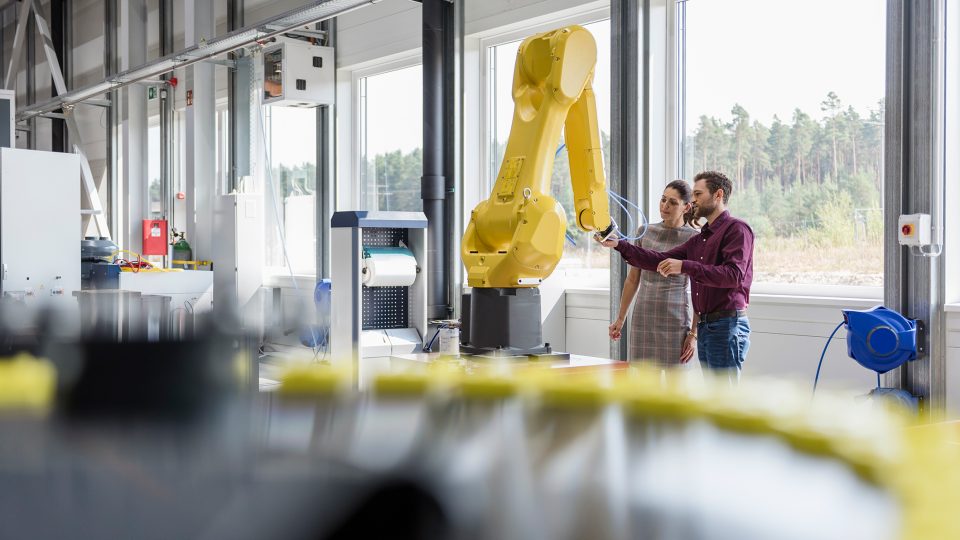Industry 4.0, the next evolution of industry powered by artificial intelligence tools and systems, is now in full force. Intelligent machines are in place in smart factories, working alongside subject matter experts to streamline processes.
- Watch analyst perspective videos on the future of AI in manufacturing
Each era of industry – from steam, to electricity, to computing – has brought about a drastic rethinking of the way businesses works. Industry 4.0 is no exception: Industry 4.0 is revolutionizing the traditional control system, allowing manufacturing companies to be safer, more efficient, more productive and more profitable.
How are businesses using Industry 4.0?
Manufacturers are using Industry 4.0 solutions across many industrial applications:
- Simulation to prepare for real-world scenarios: Bell is using AI technologies to prepare an intelligent unmanned aircraft to identify landing zones and land autonomously.
- Collect, analyze and apply data for predictive maintenance: 3M uses AI in its smart factory, customizing the capabilities of the industrial internet of things (IIoT) to reduce downtime and save both money and effort.
- Machine learning to make continuous improvements: PepsiCo used an AI manufacturing solution to maintain consistency and quality in its much-loved Cheetos. The company started with the baked puff and is now exploring other products.
- Drive efficiency and energy savings: Intelligent systems can power energy savings by using AI in building system management. Microsoft uses autonomous smart building technology to work toward the goal of becoming carbon negative by 2030.
- Scale operations by leveraging human expertise: NOV is training employees in a fraction of the time with the help of an AI solution that learns from the expertise of company machinists, then passes that knowledge along.
- Real-time optimization and tracking: Ricoh’s connected factory collects and interprets telemetry data, making adjustments to machines live. Camera technology enables inventory tracking at all stages of the production cycle.
- Collate a single source of truth: GE Aviation’s Digital Group used AI capabilities to bring multiple sources of data together to build a flexible digital model of any aircraft and analyze its health, efficiency and complete history.
Where will Industry 4.0 go next? Everywhere.
Almost every industry is already being impacted by Industry 4.0 and AI transformation. Use cases for autonomous systems solutions span logistics, energy, manufacturing, mining and more. So how can you take advantage of all that Industry 4.0 has to offer?
Get your business AI-ready with strategic, holistic thinking. Industry 4.0 can solve your organization’s toughest existing problems, but it’s important to think bigger and broader than that. Plan your AI innovation strategy for your company’s unique goals and value and explore what the future could look like when you apply AI everywhere. Microsoft created the online masterclass AI Business School to help leaders define their own AI strategy and be ready for the future with Industry 4.0.
Partner Industry 4.0 solutions with human expertise. The tools and solutions made possible by Industry 4.0 are meaningless without pairing AI with human ingenuity. Microsoft Project Bonsai is a low-code platform that speeds up the creation of AI-powered automation.
Use Industry 4.0 capabilities responsibly. Everything you do as an organization should be aligned with your institutional values, goals and priorities. In addition, it is important to consider the implications of using AI and be deliberate about using it responsibly. Visit the Microsoft Responsible AI Resource Center for guidance on using AI responsibly from concept to execution.
Learn more about AI in manufacturing:
- Free ebook Get started with autonomous systems: A manufacturer’s use case selection guide
- Free ebook Industry 4.0: Inside autonomous systems on the factory floor
- Meaningful innovation: Human ingenuity, powered by AI
- Project Bonsai: Autonomous systems AI platform for Industry 4.0
- Your guide to Industry 4.0: AI Business School
- Put AI into action and empower everyone in your organization
- Industry 4.0 autonomous systems solutions
- From automated to autonomous systems: Microsoft’s developer platform aims to accelerate the journey




